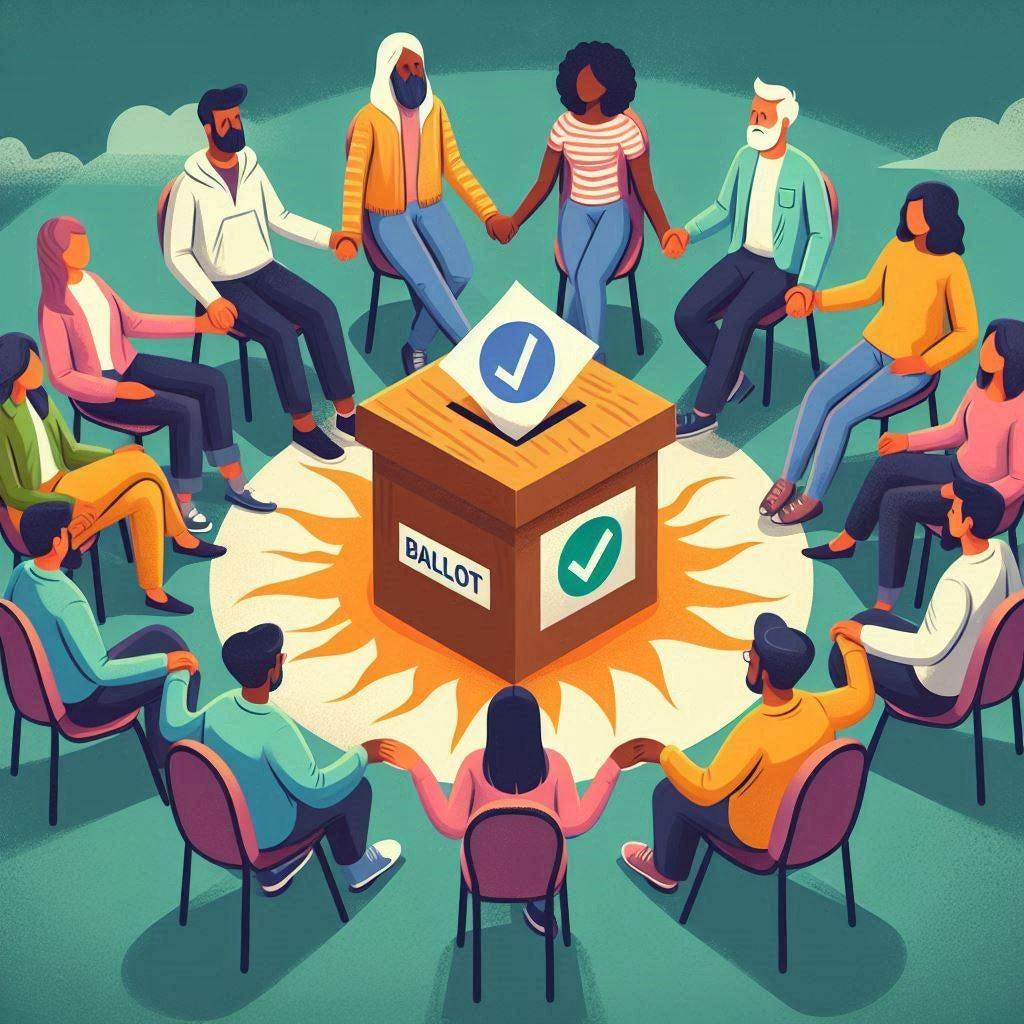Whatever the result, it will provide the energy for our becoming.
As we navigate this election cycle, most of us likely feel a sense of turbulence—waves of fear, change, and hope intermingling that leave us destabilized. Yet, if we look closely, this pivotal moment in history invites us to embrace a different way of being, one aligned with the relational wisdom I discussed in my recent series on addressing the metacrisis. The challenges of the metacrisis ask us to look beyond the familiar lens of binary thinking, as exemplified by today’s stark political divisions and instead cultivate healthy relational frameworks—new ways of connecting, trusting, and belonging that foster the deeper resilience needed to face the uncertainty ahead.
In previous articles, I highlighted the necessity of embodied relationality, the importance of presence, and the value of human connection to transcend the transactional interactions so prevalent today. This election offers a real-world laboratory for applying these insights. More than just a political exercise, it’s an opportunity to examine how we relate—to ourselves, to each other, and to the systems we inhabit—and how these relationships shape our responses and our sense of agency.
The Election As A Symptom of Relational Disconnect
The metacrisis is often described as a convergence of existential threats, from ecological collapse to political polarization. Beneath these issues, however, lies a subtler crisis: one of belonging, connection, and the loss of a shared reality. This election amplifies this disconnection by highlighting divisions that not only run across party lines but also through communities and even families. It’s easy to focus on the obvious fractures themselves, but perhaps the more salient question is: how did we arrive here and become so divided? The answer, at least in part, is that modernity has driven us into increasingly individualistic ways of being, cutting us off from the interdependent relationships that once anchored and nurtured us.
In this context, this election is more than a contest for power. It’s a collective ritual that reflects our struggles with belonging and connection. I imagine many of us long for leaders who will bridge these divides and restore a sense of shared reality, yet we rarely take time to assess the health of our own relationships or our role in cultivating this mutual reality. Instead, this election and the metacrisis have become mirrors, reflecting our unfinished work. Rather than look to leaders who will give us a sense of our inner aliveness, I suggest we address the barriers within ourselves that inhibit our experiences of love, intimacy, and self-worth.
Embracing Uncertainty as Collective Responsibility
One way we can apply the relational perspective is by shifting our approach to uncertainty itself. Rather than seeing uncertainty as something to be eliminated by clear-cut political choices and outcomes, we can accept it as an invitation to deepen our way of relating to ourselves and the world around us. The uncertainty we feel during this election is actually a form of collective responsibility. If we can resist the temptation to find quick solutions, we are compelled to ask more open-ended questions about our values, our sense of direction, and how we relate to one another across differences.
This more balanced approach invites a shift from "What will happen if X or Y wins?" to "How will I show up for my relationships and my communities, regardless of the outcome?" From this relational perspective, holding uncertainty becomes less about waiting for external solutions and more about cultivating inner clarity, a clarity rooted in our commitment to show up authentically for others while remaining aligned with something greater than ourselves. It’s this kind of resilience that can weather political storms because it’s one based not on outcomes but on the quality of our connections - inner (Beauty), between (Goodness), and among us (Truth).
Cultivating a Culture of Trust
The final insight from my previous series that we can bring to this election cycle is the call to transcend transactional relationships. Elections often reduce our choices to performative exchanges, like votes for promises and political alliances for favors. However, a relational perspective reminds us that the health of a society isn’t measured in transactions alone; it’s measured in trust in oneself and others. Trust is built not by what we get from one another but by how deeply committed we are to the well-being of the collective.
In the context of this election, I encourage us to ask ourselves: Are we willing to engage in compassionate conversations, even when we disagree? Can we move away from seeing others as primarily opponents? And perhaps most importantly, can we see them as people attempting to navigate the same reality as we are, because we need others to help us make sense of an increasingly complex world?
A Collective Wisdom Beyond Certainty
In these turbulent times, embracing a relational perspective offers us a new form of wisdom—one that doesn’t offer certainty but invites us to hold uncertainty with grace, dignity, and resilience. This election understandably feels overwhelming, but it’s also a reminder that we are interconnected and that our collective future depends upon how we organize ourselves, inside and out.
Let’s approach this election not with the sole expectation of winning (or the fear of losing) but as a journey through uncertainty and part of our collective growth. By doing so, I believe we may find a steadying wisdom amid the turbulence, one rooted in the hope that when we stand together—truly together—we can weather even the greatest of challenges with respect for one another and life, itself.



